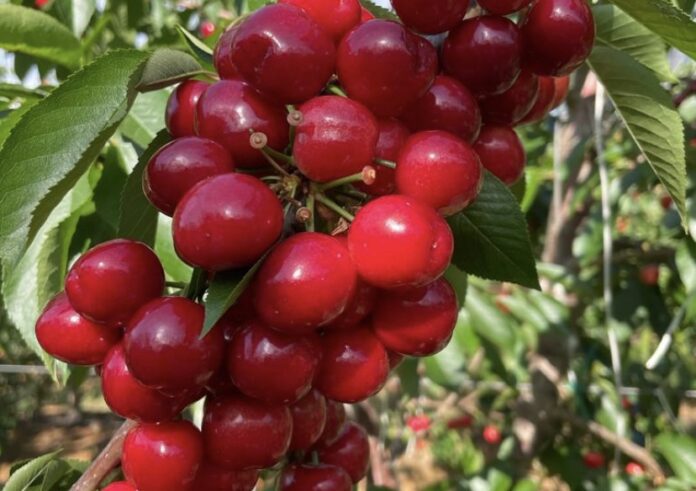Cherry season is one of the briefest, but also most exciting times on the South African fruit calendar and it is currently in full swing.
Although the crop is about 20% smaller than anticipated, Tru-Cape’s cherry producers are thrilled about the quality and size of these ruby red jewels.
“It’s some of the best quality cherries we’ve ever seen,” says Calla du Toit, Tru-Cape’s procurement manager enthusiastically.
Nico Verhoef, director at Witzenberg Properties, describes fruit sizes as phenomenal.
“Pack-outs are also really good. Although volumes are down, the crop is well balanced with quality and fruit size.”
Tru-Cape’s total crop size is down from an estimated 520 tons to just over 400 tons, due to unfavourable weather conditions, especially during flowering and set. A cold spell and frost in mid-September hit some cherry producers particularly hard.
“We lost a considerable volume of cherries due to frost. The Ceres area was subjected to load shedding from 04h00 to 06h00 on the morning of the frost, leaving producers powerless to combat it with irrigation,” explains Calla.
Demand on the rise
The market seems to agree about the outstanding quality of South African cherries, with demand shifting from the United Kingdom to the Middle and Far East. Malaysia, Vietnam and Hong Kong are certainly on the rise as markets for our wonderful cherries.
“We get incredible feedback about the quality of South African cherries. According to importers we are well positioned to compete with the Chileans,” says Calla.
Tru-Cape’s apple exports to Vietnam has grown exponentially over the past few years. This creates excellent opportunities for the company’s cherries, as retailers prefer to procure a basket of products from the same source.
About 70% to 80% of locally produced cherries is marketed within the borders of South Africa. As the cherry season is short and sweet, Tru-Cape is exploring opportunities with local retailers to extend the availability on shelves with optimum storage – something that consumers can look forward to in future.
Producers are content with the prices they are currently realizing. The exchange rate and weak rand also counts in their favour.
“The market is stable and prices are on average R10 to R20 per kg better than the previous season. Local and international demand is also good,” says Nico.
All Tru-Cape’s cherries are exported via air freight, which helps to alleviate the pressure on the port of Cape Town.
Deon Malherbe from Eselfontein farm in the Warm-Bokkeveld says cherry producers are looking forward to the opening of the Chinese market for South African cherries, as China holds immense potential for the cherry industry.
“We are already thinking about the preferences of Chinese consumers and retailers when we plan for future expansions.”
Technology and expansion
With expansion of about 98% in hectares planted to cherries over the last five years, Ceres is now the biggest cherry producing area in South Africa. Cherries fit in very well with apple and pear farming, as it allows producers to take advantage of resources such as cooling infrastructure or off loading facilities in a time when it is underutilized.
“Producers are getting more familiar with the crop and thanks to new varieties, rootstocks and cultivation techniques, the cherry industry is poised to grow even more in future,” says Calla and adds that Tru-Cape aims to market 1000 tons cherries in the near future.
Thanks to technology such as low chill varieties and DC-tech-nets producers can further exploit opportunities in favourable marketing windows, says Deon.
“We are in production from late October – the earliest in the Western Cape – when prices are still very good. Rain poses the biggest threat to cherry producers and therefore we should consider establishing orchards under nets, but also planting varieties with some tolerance to rain.”
Another advantage is that cherries need much less irrigation than other crops – especially under nets.
“You basically need a third of the water, resulting in a smaller environmental footprint,” says Deon.
Nico cautions that due to the short harvest and marketing window (only about ten weeks), cherry production demands focused farming practices, access to proper packing facilities and good market access.
“Nevertheless, cherries remain a special and exceptional product. It brings unknown excitement to the fruit industry.”
For more information, please contact Lucille Botha at lucilleb@tru-cape.co.za or visit www.tru-cape.com. Follow Tru-Cape on X (@TruCapeFruit), Facebook (@Tru-Cape Fruit Marketing) and Instagram (@trucapefruit).








